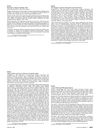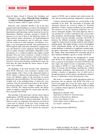January 2020 in “Proyecto de investigación:” Longer anogenital distance may indicate a higher chance of having polycystic ovary syndrome, and measuring this distance along with hormone levels could improve diagnosis.
 April 2017 in “Journal of evolution of medical and dental sciences”
April 2017 in “Journal of evolution of medical and dental sciences” Most women with excess hair growth had Polycystic Ovary Syndrome, and severity wasn't linked to hormone levels.
 May 2015 in “Evidence Based Women Health Journal (Online)”
May 2015 in “Evidence Based Women Health Journal (Online)” Inositol was more effective than metformin in improving menstrual cycles and pregnancy rates in PCOS patients.

The main cause of hirsutism in Algerian women is polycystic ovary syndrome, and those affected should be checked for related hormonal issues.
 January 2006 in “Fertility and Sterility”
January 2006 in “Fertility and Sterility” The book provides a detailed guide on managing Polycystic Ovary Syndrome and is useful for physicians.
 April 2005 in “CRC Press eBooks”
April 2005 in “CRC Press eBooks” Excessive androgens in women with polycystic ovary syndrome can lead to excessive hair growth and hair loss, but this might not fully explain these conditions.
June 2002 in “Current obstetrics and gynaecology/Current obstetrics & gynaecology” Hirsutism, excessive hair growth in women, often caused by high androgen levels and polycystic ovary syndrome, can be treated with medication and weight management.
 1 citations,
May 2023 in “Frontiers in Endocrinology”
1 citations,
May 2023 in “Frontiers in Endocrinology” Autism's genetics are linked with early age of puberty and less hair loss, but not with hormone levels or polycystic ovary syndrome.
 162 citations,
January 2015 in “Trends in Endocrinology and Metabolism”
162 citations,
January 2015 in “Trends in Endocrinology and Metabolism” Women with PCOS face higher risks of diabetes and heart disease, and these risks increase with obesity.
 155 citations,
March 2006 in “The American Journal of Medicine”
155 citations,
March 2006 in “The American Journal of Medicine” Women with PCOS have heart-related issues not because of obesity, but due to insulin resistance and low adiponectin levels.
 62 citations,
April 2013 in “Steroids”
62 citations,
April 2013 in “Steroids” PCOS symptoms change with age; younger women have higher androgen levels and less metabolic issues, while older women face more metabolic challenges despite milder PCOS symptoms.
 11 citations,
July 2003 in “The Nurse practitioner”
11 citations,
July 2003 in “The Nurse practitioner” New treatments for PCOS focus on managing symptoms and improving fertility.
 5 citations,
February 2023 in “Journal of Clinical Medicine”
5 citations,
February 2023 in “Journal of Clinical Medicine” Diagnosing and treating PCOS in teenagers is difficult, and the focus is on lifestyle changes and medication to improve health and prevent future issues.
 3 citations,
December 2016 in “PubMed”
3 citations,
December 2016 in “PubMed” Menstrual abnormalities in PCOS women may not greatly affect their metabolic and hormonal profile.
 1 citations,
January 2023 in “Deleted Journal”
1 citations,
January 2023 in “Deleted Journal” PCOS negatively affects women's quality of life, especially if not detected early.
1 citations,
January 2009 in “PubMed” PCOS affects many women and can cause various health issues, with several treatments available.
 December 2024 in “Quality in Sport”
December 2024 in “Quality in Sport” PCOS involves immune system issues and inflammation, possibly leading to autoimmune diseases.
 August 2024 in “Indian Journal Of Clinical Practice”
August 2024 in “Indian Journal Of Clinical Practice” A balanced diet and healthy lifestyle help manage PCOS symptoms.
March 2024 in “LGU journal of life sciences” Poor diets worsen PCOS symptoms in young women.
February 2024 in “Biomedicines” Pregnant women with PCOS have higher levels of Neurokinin B in the placenta, especially with female babies.
 January 2024 in “Endocrine and metabolic science”
January 2024 in “Endocrine and metabolic science” Different types of PCOS need specific diagnosis methods and treatments.

Hair loss in women with PCOS is linked to high androgen levels but the relationship is unclear.
 September 2023 in “F&S reports”
September 2023 in “F&S reports” PCOS may increase the risk of mental health issues like depression and anxiety.
 July 2023 in “CRC Press eBooks”
July 2023 in “CRC Press eBooks” Plant-based substances like chamomile and aloe vera may help treat PCOS symptoms.
 May 2023 in “Journal of Student Research”
May 2023 in “Journal of Student Research” Creating specific biological indicators is important for early detection and treatment of PCOS.
Women with PCOS have different body composition and some metabolic differences compared to healthy women.

The conclusion is that a more comprehensive and precise approach is needed for diagnosing PCOS to address its broader health risks.
 March 2012 in “Journal of Pediatric and Adolescent Gynecology”
March 2012 in “Journal of Pediatric and Adolescent Gynecology” Doctors vary in how they initially test for PCOS, but most agree on using oral contraceptives and lifestyle changes as first treatments.
 March 2022 in “International journal of pharmaceutical sciences review and research”
March 2022 in “International journal of pharmaceutical sciences review and research” PCOS is a hormonal issue in women that is usually treated with birth control pills, metformin, and lifestyle changes, with early treatment helping to reduce complications and improve life quality.
 189 citations,
March 2018 in “Human Reproduction Update”
189 citations,
March 2018 in “Human Reproduction Update” Women with PCOS are more likely to have impaired glucose tolerance and type 2 diabetes, especially if they are Asian or obese.























